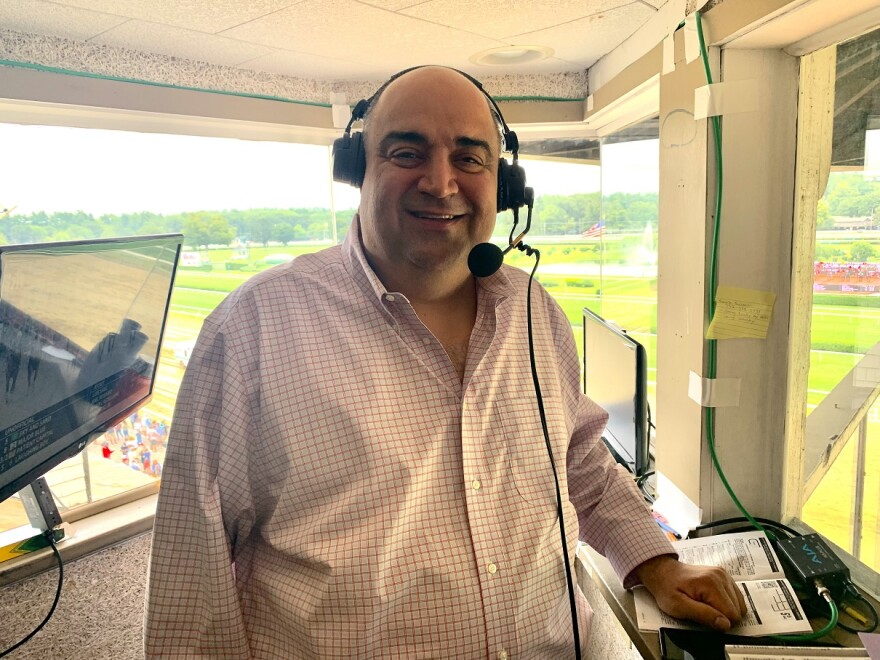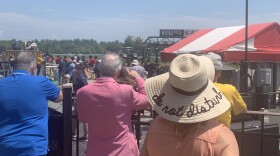Fans at Saratoga Race Course this summer are hearing a new announcer in the booth. Frank Mirahmadi comes to New York from California.
“Up next, race five. Scratch number eight, Joking Way…”
Taking the reins as the New York Racing Association’s new Saratoga caller after John Imbriale scaled back, Frank Mirahmadi brings decades of experience and a straight-forward style. He comes to Saratoga full-time after calling at Santa Anita.
In California, Mirahmadi grew up with days at the races.
“When I was about 5 or 6 years old, my dad would take me to the track and by the time I was 9, I was totally into it. It’s the only thing I wanted to do on weekends, was to go to the horse races. And I know that because when Seattle Slew won the Triple Crown, he came out to the Swaps Stakes, and there were like 70,000 people in Hollywood Park and that was one day that my dad just didn't want to fight that crowd. It was gonna be an incredibly long walk, an enormous crowd. And I was very disappointed not to go there. I was very sad when Seattle Slew lost, I listened to the race on the radio. So by age 9, I was fully into it.”
Mirahmadi says he started imitating announcers as a kid, including legendary South African Trevor Denman, a California racing fixture, but he isn’t sure when he decided to turn it into a career.
“I know that in 1992, after I had met Trevor Denman for the first time in his booth at Del Mar in 1990, and I had made a tape for him imitating his style – I made it on a VHS tape of the world record performance of Spectacular Bid win at Santa Anita, when he went 1:57 and 4 – I called that race, which was called as Dave Johnson, you know, Dave Johnson called it live. I dubbed it over as Trevor and I sent it to him, it was a really…he was very warmly received it. It was a great conversation we had after he received it. But it started the momentum building to go after what I wanted to do without me knowing it.”
In 1992, Mirahmadi says he offered his services to Hollywood Park imitating the vacationing Denman. They let him do it on the closing day of the ’92 season. After that break, Mirahmadi wanted to pursue it as a career. But for years, as he puts it, nothing happened.
“It was three years and three months before I got my first job. But I got a couple of shots, including to fill in at Hialeah in ’95. And I definitely did the things that were necessary to pursue a dream. And it just came through. It's hard to believe that steps I took and the places I went in order to make it happen, but it's very gratifying to look back at it now and know that you can go after something and never, ever say no to a dream. You got to just keep dreaming. So, I don't know that I always wanted to do it. But I certainly loved it, it made sense, and eventually it just came to fruition.”
“So you made your tape and you sent it in and ‘92 imitating someone else, but then how long does it take to find your own voice? How long did it take you to find your own voice?”
“It was very comfortable for me to call as other people, so I did a guest appearance at ’92 closing day, guest appearance, again, ’94 closing day, and then a guest appearance one more time in ’95 closing day. But at that point, by ’95, I was trying to get into the industry, sending tapes out and such. And people said, ‘Hey, I want to know what you sound like.’ And so, I made a tape. In 1994, I went to Bluegrass Downs and I was helped out by the announcer there, Michael Wrona, to put a tape together with six of my own race calls, of which two I found that were somewhat listenable, and I put that on my resume reel. And I noticed that after I got started, I was calling in ’95 filling in for four days in Hialeah, and then I eventually got the job in ’96 at Hialeah Park in Florida, and I realized that I was much more comfortable as other people than myself. And so, it has taken a little bit of time to establish a quote-unquote style, which I can't really even describe as a certain type of style. I take pride in reading race well. I believe I read races very well, with, you know, so it's important not to give too much opinion, but to also inform the fans what's going on and what you see.”
In a 2012 article in the Daily Racing Form, called “Oaklawn announcer Mirahmadi finding his own voice,” writer Marcus Hersh acknowledges Mirahmadi’s “gift for impersonation,” but recognizes his “decidedly straightforward” calls that set him apart from other announcers, including longtime former NYRA caller Tom Durkin. Mirahmadi calls that article and the 2012 season a “defining moment.” Afterwards he began being assigned to bigger races. He remembers calling Triple Crown winner American Pharoah three times in 2015.
When asked to describe his job, Mirahmadi calls it “celebrating winners.”
“You know, it's difficult in any kind of sportscasting to be completely unbiased or to not have some sort of a lean in a certain direction. I take pride in just trying to call what I see. And you know, even my doctor, one day said, ‘Well, I know you bet that horse.’ And I was just like, ‘Doc, we've shared everything, you know everything about me, you're wrong.’ But I hope I sound like I bet every winner because I need to have that excitement level to make sure that I'm delivering for the connections. That's my job. I'm here to paint a picture. At the same time of all this, no one needs to take themselves too seriously. I'm just calling horses moving around an oval. But the key is to try to make it memorable for those who win and to make it thorough for those who are just listening. Like, so, I learned early on always know where the favorite is because most of the money is bet on the favorites, or people either rooting for the favorite or against the favorite. And so, it's important to know where those horses are and to let the fans know. Also, always give every horse at least one call in a race no matter how far back there. You can start to separate the contenders from the pretenders when they move around the far turn but you can hear the bugle now, so let's walk up to the window and I'll take you through this entire process…So this is the call to post. We'll give the buglers a little love since it's being recorded…The father and son team of Tony and Carson Gambaro bring the horses onto the track for the fifth race…”
With 4 minutes to post, Mirahmadi intensifies his preparation. He colors in a list of the runners with crayons to match the silks of the jockeys, and practices naming the thoroughbreds aloud. He trains a pair of binoculars on the starting gate.
“They're in the gate…and they’re off! Sky and Sand, Laughing Boy vying for the early lead. Outside of them, Patient Capital. Perfect Day is now coming through, as is Major Blue in the green…”
With threatening clouds overhead, the crowd below cheers on the runners as Mirahmadi calls the race.
“It’s Sky and Sand, coming to the quarter pole, opening up two-and-a-half-lengths now, doing it easily thus far. Major Blue swings out to try and get closer. These two are about three lengths clear of the next flight headed by Patient Capital and Laughing Boy. It's all Sky and Sand. Sky and Sand by four past the 16th pole, and much too good. Sky and Sand wins it by four and a half lengths, Major Blue was second, Patient Capital third, then Laughing Boy…
It’s all over in two minutes. Removing his headset, Mirahmadi comments on winner Sky and Sand’s coat color and a longtime racing superstition.
“They like to see a gray on a rainy day and that was exactly what that was…”.









